CANDLE & CHRONICLE
Quarterly Newsletter: September 2023
Introducing our new board of directors
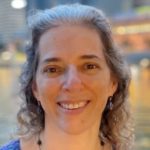 Teach the Shoah has been growing by leaps and bounds. We are excited to announce a major milestone in that growth: Teach the Shoah has convened its first official Board of Directors. We are proud to introduce you to this amazing group of people.
Teach the Shoah has been growing by leaps and bounds. We are excited to announce a major milestone in that growth: Teach the Shoah has convened its first official Board of Directors. We are proud to introduce you to this amazing group of people.
Dr. Alisha Wimbush, Program Director of Religious Leaders for the Institute for Islamic, Christian, and Jewish Studies, is an expert in interfaith relations and programming.
Ms. Erica Guerra is a semi-retired marketing and media consultant, experienced helping small nonprofits with marketing, communications, and social media outreach.
Dr. Mehak Burza, Head of Global Holocaust and Religion Studies at the Global Center for Religious Research, is a Holocaust scholar from India. She has deep connections to the academic community. She is also one of Teach the Shoah’s regular storytellers.
Dr. Michael Fripp is one of our founders. He is also a dedicated storyteller and our right-hand-man in everything.
Mr. Mitch Gordon, founder of Gesher: Building Bridges, is a storyteller and musician with extensive experience in non-profit management and fundraising.
Mr. Paul Dietz is a retired businessman with experience in organizational management, long-range financial planning, and international sales.
Ms. Tanya Wisoker, Education Director at Rodef Sholom Temple, is an educator and storyteller with a background in evaluating educational programs. She is also one of Teach the Shoah’s regular storytellers and facilitators.
Ms. Violet Neff-Helms is one of our founders and a dedicated Holocaust educator and storyteller.
We can’t wait to see where we can take Teach the Shoah with the help of this terrific team.
B’shalom, In Peace,
Deborah Fripp
Executive Director & Chair of the Board of Directors
Meet the Storytelling Director: Jennifer Rudick ZUnikoff
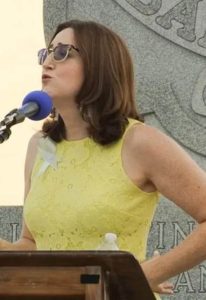 Jennifer Zunikoff loves telling Jewish stories – stories from Torah, from Midrash, from modern history, and from her own life.
Jennifer Zunikoff loves telling Jewish stories – stories from Torah, from Midrash, from modern history, and from her own life.
“It is a blessing to tell a story about someone I admire from our past,” she says. “When I perform a story about someone from the Torah or from modern history, I feel honored to share space with that ancestor.”
“When we tell stories, we are including our listeners in an intimate connection with the spiritual history of our people. The storyteller tells and the listener listens. Together, we encounter our ancestors in a sacred space.”
Jennifer is a professional storyteller and coach, a published poet, and an entrepreneur. She is the founder and director of The Golden Door: Storytelling for Social Justice, encouraging teachers and students to tell their own stories. And, of course, she is the Storytelling Director for Teach the Shoah, empowering all of us to tell true stories of the Holocaust.
Jennifer discovered Jewish storytelling in her twenties, through her work as a new teacher at a Jewish supplementary school. She soon realized that “if I was going to be a Jewish storyteller, I would be responsible for telling Holocaust stories as part of my work.”
Just weeks after her realization, Jennifer met survivor and Holocaust scholar Dr. Yaffa Eliach. She witnessed Dr. Eliach passionately speak to middle school students about the importance of remembering and celebrating the lives of her fellow European Jews before the Holocaust. Dr. Eliach insisted that we learn and speak not only about the murder of our people but also about the lives of our people.
Jennifer, who loves celebrating life, resonated with the idea of telling Holocaust stories that include the richness of each life and not only the horror of each death.
Jennifer’s love for both telling stories and teaching led her to become a storytelling coach. “I truly believe that anyone can tell a story and tell that story well,” Jennifer says. “As a coach, I am fortunate to help storytellers believe in their own abilities.”
“My intention for my work – my coaching, my storytelling, and my poetry – is to connect people to their own knowing, to a deeper part of themselves,” she says. “I hope that in my coaching in particular, I am guiding each storyteller to access their own voice, connect to their own spirit, and trust in the bond they are creating both with the people inside the story and with the listeners of their story.”
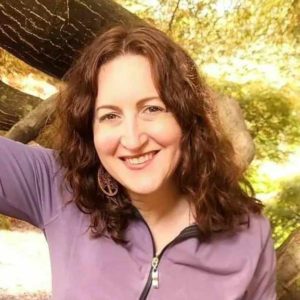 Jennifer began coaching Holocaust storytellers long before she joined Teach the Shoah. From 2004 to 2013, Jennifer co-taught the Oral History of Holocaust Survivors class at Goucher College near Baltimore, Maryland, with history professor Dr. Uta Larkey and psychiatrist Dr. Steve Salzberg. Students interviewed survivors and worked with Jennifer to learn to tell their stories. When she met Deborah at NewCAJE in 2018, the connection between her work and Deborah’s work at Teach the Shoah was obvious.
Jennifer began coaching Holocaust storytellers long before she joined Teach the Shoah. From 2004 to 2013, Jennifer co-taught the Oral History of Holocaust Survivors class at Goucher College near Baltimore, Maryland, with history professor Dr. Uta Larkey and psychiatrist Dr. Steve Salzberg. Students interviewed survivors and worked with Jennifer to learn to tell their stories. When she met Deborah at NewCAJE in 2018, the connection between her work and Deborah’s work at Teach the Shoah was obvious.
“At Teach the Shoah, we create community by sharing our stories with each other,” Jennifer says. “This community is one of the things that makes Teach the Shoah special.” She hopes that her work with Teach the Shoah helps participants recognize the power of “Holocaust education built on individual stories and creating community around those stories.”
“I am excited to work where community, creativity, history meet,” Jennifer says. “I think Teach the Shoah does that really well.”
What is Jennifer’s favorite part of serving as Teach the Shoah’s Storytelling Director? “It is a thrill to witness someone realize: ‘I can do this. I can tell the story of my mother. I can tell the story of my grandfather. I can share the story of a person whose memoir I read or whose testimony I heard. I can bring someone’s story to life.”
“Every one of you reading this article can tell a story,” Jennifer tells us. “Your story can start out very small, with a single scene. We will help you build your story. There are so many stories that need to be told.” What Holocaust story will you tell?
Introducing a new Candle and Chronical segment:
Tips from the Storytelling Director
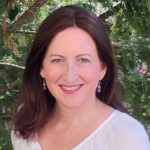 As the storyteller, you are the first listener of your story. As you tell, you are also listening. You are noticing how the story reveals itself to you. You are witnessing the story – seeing the images and feeling the emotions, not at a distance, but from within. When you listen from within, you respond from an internal, honest, and centered place.
As the storyteller, you are the first listener of your story. As you tell, you are also listening. You are noticing how the story reveals itself to you. You are witnessing the story – seeing the images and feeling the emotions, not at a distance, but from within. When you listen from within, you respond from an internal, honest, and centered place.
News & Events
We were thrilled to induct 18 graduates of our May courses into the ranks of Teach the Shoah storytellers! Nine more storytellers will complete the Moving from Testimony to Story course on September 12.
In October, we will be inaugurating our first Advanced Storytelling course for graduates of the introductory courses. We will cover topics including incorporating history into your story, advanced storytelling and story-building techniques, and how to find places to tell your story. We look forward to seeing you there! If you haven’t taken the introductory course yet, there will be another in February.
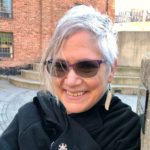 We are also thrilled to introduce Cantor Karen Webber as our new in-house poet and liturgical artist. Look for her music and poetry enhancing our programs going forward.
We are also thrilled to introduce Cantor Karen Webber as our new in-house poet and liturgical artist. Look for her music and poetry enhancing our programs going forward.
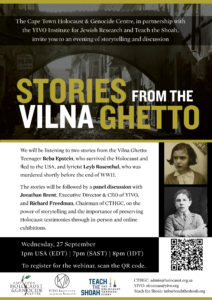 A three-way partnership with the YIVO Institute for Jewish Research in New York and the Cape Town Holocaust and Genocide Center (CTHGC) in South Africa comes to fruition on September 27 with Stories from the Vilna Ghetto. Storytellers from YIVO and CTHGC will be followed by a panel discussion with Jonathan Brent, Executive Director and CEO of YIVO, and Richard Freedman, Chairman of CTHGC.
A three-way partnership with the YIVO Institute for Jewish Research in New York and the Cape Town Holocaust and Genocide Center (CTHGC) in South Africa comes to fruition on September 27 with Stories from the Vilna Ghetto. Storytellers from YIVO and CTHGC will be followed by a panel discussion with Jonathan Brent, Executive Director and CEO of YIVO, and Richard Freedman, Chairman of CTHGC.
On November 5, join us for Sharing Their Stories: Stories of Kristallnacht, featuring stories from Lynne Feldman, Joel Loeb, Mehak Burza, and Deborah Fripp, as well as the poetry of Cantor Karen Webber. On November 28, join us for Exploring Their Stories: an Introduction to Holocaust Storytelling, featuring storyteller Steve Salzberg.
Follow us on Facebook and online for more information on upcoming events and news. You can also watch previous programs at our YouTube page.
We feel strongly that all our events should be free so money is not a constraint on participation.
We also feel strongly that our storytellers and facilitators should be paid for their work.
Your donations help us meet both of these goals.
Follow Us on Facebook & YouTube
© 2020 All rights reserved

